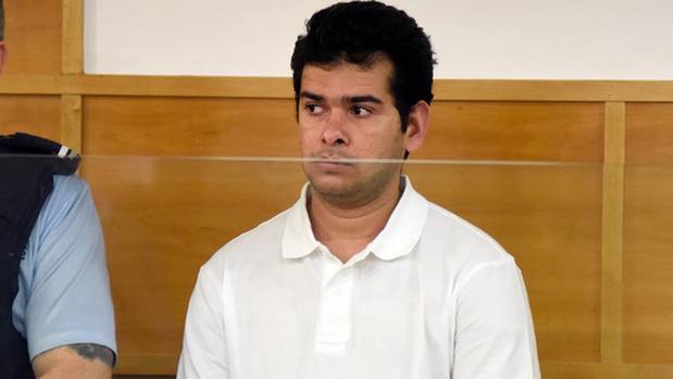
A Hamilton jury has found a man not guilty of the murder of a 14-month-old boy in an incident witnessed by another child.
Surender Mehrok, now aged 24, has always admitted causing the death of Richard Royal Arif Uddin in Tauranga on June 7, 2016 but denied it was intentional, claiming manslaughter instead of murder.
The jury agreed and today acquitted Mehrok of murder but found him guilty of manslaughter.
The jury began their deliberations at 11.30am before returning their verdict just after 4pm.
The evidence of a 5-year-old boy who witnessed the incident played a key role for the jury tasked with determining the verdict.
The jury in the High Court at Hamilton had spent the last 11 days listening to evidence about how Richard, known as Baby Royal, died.
Mehrok had admitted causing Baby Royal's death, but said he did not intend to kill him and therefore should be found guilty of manslaughter, which he admits.
The 14-month-old died while his mother, Nikita Winiata, and her friends popped out for pizza for themselves and their children.
They were away from the house for just over 30 minutes, returning to find Baby Royal covered in vomit and lifeless.
In her summing up to the jury this morning, Justice Christine Gordon said that just because the boy was 5 at the time, it didn't mean his evidence was any less reliable.
The boy's evidence had been consistent throughout, including in two police interviews, in which he stated he saw Mehrok throw Baby Royal on to the bed and then hit his head on the wall.
The child also demonstrated what happened to his grandmother, who picked him up after the incident, by picking up a teddy bear up over his head and throwing it to the ground.
He said he only saw Mehrok throw Baby Royal once, but that he hit the bed first then the wall. He had told his grandmother, who also gave evidence, that "uncle hurt Baby Royal".
Several expert Crown witnesses had submitted that throwing a baby first on to a bed then hitting a wall could not have caused the fatal injuries.
However, the defence called their own expert witnesses, that the action could have accounted for the fractures.
Stevens had said that Mehrok's actions happened "in an instant", a result of built up frustrations over an extended period - about 25 minutes - in trying to settle Baby Royal who had been crying the whole time and loudly.
Mehrok had not been thinking about what he was doing at the time.
The Crown told the jury that the child must not have seen the entirety of the assault as fellow flatmate Sukwinder Singh Rana saw Mehrok go into the bedroom with the baby three or four times. Mehrok had also admitted going into the bedroom two or three times.
Crown prosecutor Kieran Raftery had submitted that the boy either didn't see the whole assault or was mistaken about what happened.
As for the case being a retrial, the judge told the jury not to speculate as to why that was and the fact that it was is "irrelevant".
The jury had to determine Mehrok's intent.
He accepted causing the injuries, which also included hard hits to the face, but the issue was whether at the time he killed, he had the "necessary intent for murder".
The judge told the jury they had to be sure that Mehrok had one of two specific intents to find him guilty of murder.
"If you are sure of that you will find him guilty of murder, if you are not sure you will find him guilty of manslaughter."
Those intents were either that they were sure that Mehrok intended to kill him, or that when he assaulted Baby Royal he knew that the injuries would be more than minor, and that he would die from those injuries.
As for Mehrok lying to police when he was interviewed after the incident – stating he didn't cause the injuries – what weight the jury wanted to put on those claims, was up to them, but she reminded them that people lied for reasons other than because they were guilty.
In regards to witnesses, the judge reminded the jury that they needed to assess their credibility and reliability which were completely different things.
Credibility was whether they felt the witnesses were honest or sincere when they gave their evidence in the dock.
And although someone could be an honest person, they could be mistaken which was where they would need to assess their reliability.
But direct evidence couldn't be called to prove that – as it wasn't visible as to what was going on inside the defendant's head so a jury would need to draw an inference as to his intent.
Instead, they would need to rely on the surrounding evidence and ask whether it was a safe, logical and rational conclusion that they could draw.
"The really important point is that you must never speculate or guess."
The other key factor was coming to a decision without feelings of sympathy or prejudice.
Take your Radio, Podcasts and Music with you









